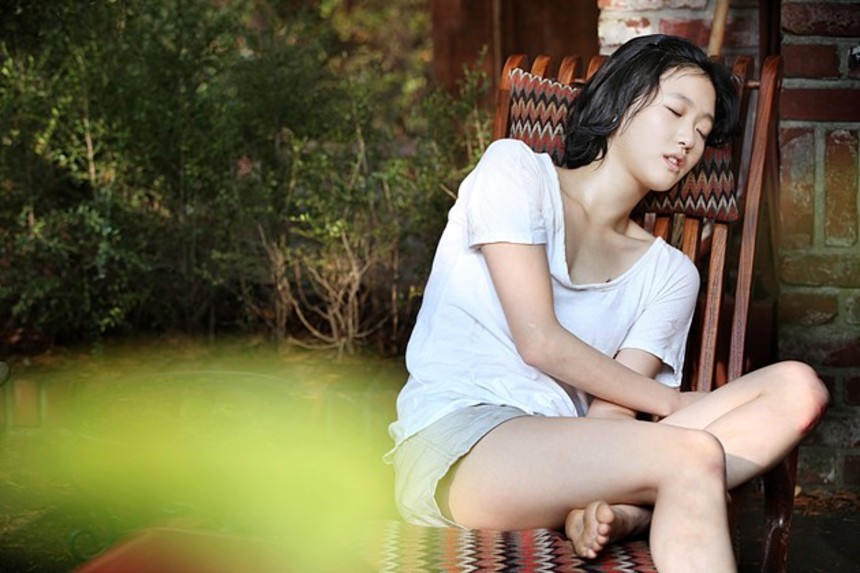NYAFF 2013 Review: EUNGYO, An Erotically-Charged Tale of Aging and Artistic Inspiration

Jung Ji-woo's fourth feature Eungyo (aka A Muse) has as its basis the salacious premise of a relationship between a 70 year-old man and a 17 year-old girl, which for obvious reasons proved quite controversial upon its release last year in Korea. Also thrown into the mix is a love triangle, the third side of which is formed by the young man being mentored by this older father figure. Adapting his film from Park Bum-shin's (also very controversial) novel of the same name, Jung spins this into a visually beautiful exploration of sexual desire, aging, and artistic inspiration that is often compelling despite its narrative and tonal miscalculations. Eungyo's greatest attraction is the quietly stunning breakout performance by young actress Kim Go-eun, a first-timer making a very auspicious start to her career in this demanding role.
The film takes place mostly in and around the country home of Lee Jeok-yo (Park Hae-il), a revered national poet who lives in self-imposed isolation, a living museum relic whose relevance has waned in modern youth-obsessed times. He is visited frequently by Seo Ji-woo (Kim Mu-yeol), Lee's protégé and a budding novelist who has just published a bestselling book. Their quiet life of serene contentment is upended by a sleeping girl they come across one day in Lee's garden. This is Eungyo (Kim Go-eun), who has climbed a ladder into Lee's property to steal a quick nap. Our introduction to her is immediately established by the ogling male gaze that will reoccur throughout the film, as the camera slowly pans across her bare legs and short shorts, taking in the fresh young body that will captivate the poet.
Jeok-yo soon after invites Eungyo over to his home, giving her a part-time housecleaning job, and clearly enjoying the visual (and no doubt other kinds) of stimulation he receives by watching her putter around the house. Eungyo, belying her seeming innocence and naïveté, clearly is aware of her effect on men, having gone to a seamstress to shorten her skirt and tighten her blouse.
This causes an immediate conflict with Ji-woo, jealous of the way Eungyo has taken over the affections of Jeok-yo, and after he finds that she has spent the night over at the house (she went there to escape her abusive mother), he urges Jeok-yo to get rid of her, suspecting that an inappropriately romantic relationship has developed between them.
For Jeok-yo's part, although he never goes so far as to actually have sex with her, he does get rather close to her by closely inspecting her body as she sleeps - he becomes fascinated by a henna tattoo on her chest, and amusingly later gets one of his own that Eungyo draws on him. But although he doesn't physically enjoy Eungyo's body, Jeok-yo's imagination runs wild with erotic fantasies in which his younger self indulges in frequent carnal activity with her. This inspires Jeok-yo to write a short story inspired by his desire for Eungyo, and which is named after her. He keeps the manuscript hidden in a chest, but when Ji-woo later finds it, his anger and jealousy increases, paving the way for a melodramatic denouement of revenge and betrayal that proves tragic for all concerned.
Jung Ji-woo made his directorial debut in 1999 with Happy End, another erotically charged drama that remains his best film. And similarly in Eungyo, he elevates a sexploitation-ready premise with a thoughtful and visually arresting approach to his subject matter that freely mixes elements of fantasy within its fabric. However, Jung's success at this is marred by an unfortunate tendency, especially in the latter scenes, to veer into overheated melodramatic histrionics, for example in the inevitable fight between the two over Eungyo.
Park Hae-il is quite good as the aged poet, in an often movingly sensitive portrayal; however, despite all the make-up he wears, he never quite convinces as a 70-year-old man - we never really stop being aware of the much younger man underneath. Kim Mu-yeol makes rather less of an impression as the aspiring - and, as it turns out, ethically challenged - novelist. This, however, may be a function of how his character is written, one of the more weakly conceived elements of this story.
But, truly, the show really belongs to Kim Go-eun, who bravely treads into the treacherous waters of a role surrounded by scandalized controversy, and involving fairly explicit sex scenes, with a freshness, naturalism, and a seeming lack of self-consciousness that is charming and quite refreshing. More than anything else, she is the most convincing reason to see Eungyo. The New York Asian Film Festival clearly agrees; to add to the large collection of awards Kim has received for her performance in Korea, she will be awarded the Star Asia Rising Star Award at the NYAFF screening.
Eungyo screens on June 29, 6:35pm at the Walter Reade Theater. For more information, and to purchase tickets, visit The Film Society of Lincoln Center's website and NYAFF's website.

Do you feel this content is inappropriate or infringes upon your rights? Click here to report it, or see our DMCA policy.






